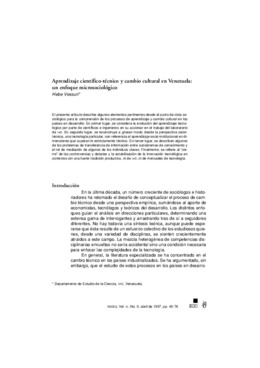Aprendizaje científico-técnico y cambio cultural en Venezuela : un enfoque microsociológico
Scientific and technical learning and cultural change in Venezuela
Abstract
El presente artículo describe algunos elementos pertinentes desde el punto de vista sociológico para la comprensión de los procesos de aprendizaje y cambio cultural en los países en desarrollo. En primer lugar, se considera la evolución del aprendizaje tecnológico por parte de científicos e ingenieros en su accionar en el trabajo del laboratorio de I + D . En segundo lugar, se reconstruye a grosso modo, desde la perspectiva sociotécnica, una tecnología particular, con referencia al aprendizaje socio-institucional en dimensiones que superan lo estrictamente técnico. En tercer lugar, se describen algunos de los problemas de transferencia de información entre subsistemas de conocimiento y el rol de mediación de algunos de los individuos claves. Finalmente, se refiere al “cierre” de las controversias y debates y la estabilización de la innovación tecnológica en contextos sin una fuerte tradición productiva, ni de I + D , ni de mercadeo de tecnología. This article describes some relevant elements from the sociological point of view for the understanding of the processes of learning and cultural change in developing countries. In the first place, the author analyzes the evolution of technical learning by scientists and engineers working within the R & D laboratory. Secondly, a specific technology is briefly outlined from a sociotechnical perspective, with regard to socioinstitutional learning and taking into account elem ents that go beyond a merely technical approach. Thirdly, the author describes some of the problems met in the transference of information among subsystem s of knowledge, and the role of mediator that befalls on some key individuals. Finally, the author mentions the “closing” of controversies and debates, as well as the stabilization of technological innovation in contexts without a strong tradition in production, in R & D , or in the
marketing of technology.

